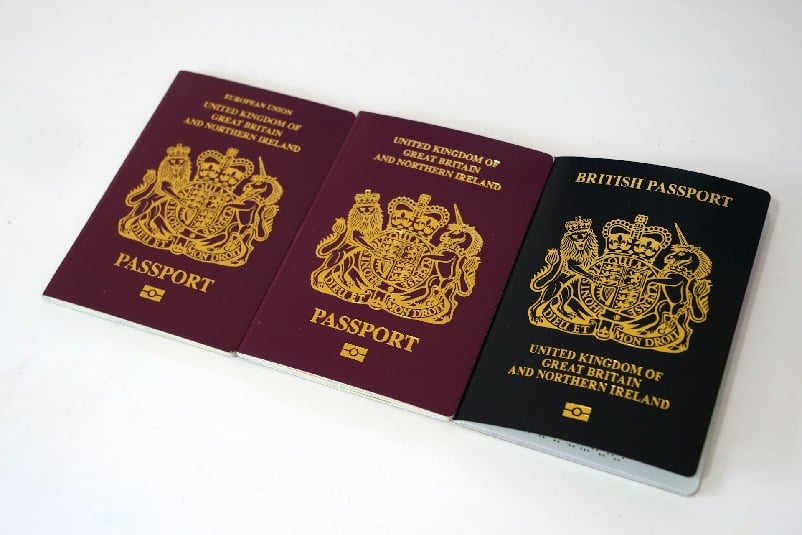How Many Months Do You Need on Your Passport to Travel?
You may need a new passport to travel if your current passport has less than six months’ validity, does not have at least two blank pages, or is more than ten years old, depending on your nationality and travel destination.
IAS can help with your travel planning. We’ll assist you with determining the passport and entry requirements for your destination and complete the necessary applications. Call us today at +44 (0)333 414 9244 or via our online contact page to speak to one of our expert immigration attorneys.
Read our 1001 reviews
Checking Your Passport’s Validity Before Travelling
Checking passport validity is hardly at the top of your mind, especially if you’re not a frequent traveller. Most people only remember to check their passport validity after planning their trip. This has led to many holiday plans going awry.
However, the first step when planning a trip, whether for work, vacation, or to visit family, is to check your passport validity. Your passport validity can determine whether you’ll be allowed into your destination. You may be denied boarding or entry into your travel destination if your passport is close to expiry, even if you have a valid visa or other entry permit.
Checking passport validity is especially important if you’re travelling with children. Children’s passports usually have shorter validity durations in most countries, and parents/guardians tend to forget this detail.
The specific passport validity rule varies across different countries and regions. You should check the passport requirements for your destination to ensure your passport is valid for entry.
Passport Validity Rules
Each country has specific passport validity rules that determine your ability to visit based on how long you have until your passport expires. Some countries require that you have at least three months of validity, some less than three months, while many follow the six-month validity rule.
You can find the passport expiry rule on each country’s immigration website. UK nationals can check the passport requirements of their intended travel destination on the UK government travel advice website (FCDO).
While passport validity requirements vary across countries, applying for a new passport is generally recommended if you have less than six months on your passport, regardless of the duration of your trip and the country’s passport requirements.
Below are the most common passport expiry rules based on the required validity period for entry.
Valid For Stay Duration
Some countries do not have specific passport validity durations. However, they require that your passport be valid for the entire duration of your stay. Some specify that your passport must have an expiry date after your intended departure date.
If you’re planning to travel to the U.S., Canada, Australia, Anguilla, Argentina, Barbados, Japan, Mexico, the Dominican Republic, Seychelles, or Tunisia, your passport must be valid for the duration of your intended stay. The requirement for the Dominican Republic may change in the coming months following the proposed immigration changes that will take effect in November 2025.
Chile and St. Lucia specify that your passport’s expiry date must be after your proposed exit date, while the Maldives requires that your passport remain valid for at least one month after your arrival.
If you’re travelling to Australia, there is a chance that you’ll have flight layovers. You should also check the validity requirements of layover countries. If you’re travelling to New Zealand or South Africa, your passport must be valid for at least one month after your exit date.
Three Months Validity
Certain countries require that you have at least three months before your passport expires. For some, your passport must be valid up to three months after your departure date, while some only require at least three months of validity from the day you arrive.
To travel to Switzerland, Norway, Iceland, Liechtenstein, or the Schengen Area, your passport must be valid for up to three months after your departure date.
If you’re travelling to Morocco or Belize, your passport must be valid for at least three months after arrival. However, border officials sometimes insist on 6 months’ validity.
Six Months Validity
Countries in this category require at least six months of validity on your passport to enter. The six-month requirement also varies for different countries. For some countries, the requirement is six months of validity after your departure date, while others require six months from your arrival date.
What is the Passport Six-Month Rule?
Most countries require a passport that’s valid for at least six months to be granted entry, even for short stays.
This is known as the six-month rule and is primarily to avoid problems with immigration and border control should your passport expire before you leave the country. For example, if an unforeseen circumstance extends your stay, like the COVID-19 pandemic did for many travellers. You won’t be admitted into these countries if your passport is valid for less than six months.
The six-month rule has two variations. Some countries require that your passport have at least:
- Six months’ validity after you arrive
- Six months’ validity after the date you intend to leave the country
Popular countries that require six months’ validity after you arrive include Egypt, India, China, Kenya, Brazil, Thailand, Jordan, Antigua and Barbuda, Singapore, Malaysia, Peru, Grenada, Sri Lanka, the UAE, Qatar, Indonesia, and Taiwan.
If you plan to travel to Cuba, your passport must be valid for at least six months after arrival and three months after your exit date. This means if you want to visit Cuba for up to six months, your passport must be valid for at least 9 months.
You need at least six months of passport validity after your intended departure date to be granted entry to the Bahamas or Colombia.
Blank Pages Requirement in Your Passport
In addition to having a valid passport that covers your travel duration, many countries require that your passport have one or two blank pages to qualify for entry. The blank pages are necessary for your visa, entry and exit stamps, and visa on arrival (if you need one).
The U.S. and Bermuda do not have any specific blank page requirements. However, your passport must have sufficient space for your visa and entry and exit stamps.
Your passport must have at least one blank page to travel to Egypt, Japan, Canada, Australia, Brazil, New Zealand, Thailand, Mauritius, Rwanda, or Turkey. Turkey also requires that your passport be valid for up to 150 days after arrival.
Countries that require at least two blank pages for entry include India, China, Indonesia, Jamaica, Kenya, Bolivia, South Africa, and Vietnam. Schengen countries also require at least two blank passport pages for non-EU citizens.
European Union Passport Validity Rules
Aside from the regular passport expiry rules, EU and EEA countries have other unique passport validity requirements. To enter the EU, your passport:
- Must be valid for up to three months after your departure date
- Must be less than 10 years old
So, if your passport was issued more than ten years ago or will be 10 years old soon, you will not be admitted to the EU, even if you have up to three months (after departure) before your passport expires.
This rule particularly affects UK nationals who renewed their visas before 2018. Before 2018, the remaining validity period (up to 9 months) of your old passport was usually added to the new one when you renewed your passport. For example, if you had 7 months left on your passport and applied for a renewal, the 7 months is added to the 10-year validity of your new passport, making the expiry date 10 years and 7 months from the issue date.
However, this extra 7 months does not count for travel and immigration purposes, particularly if travelling to an EU country. Your passport validity starts counting from the issue date and ends 10 years from that date. You won’t be able to travel to the EU with a passport issued 10 years and 1 month ago, even though you still have six months before the expiry date.
If you got your passport before 2018 and have only about 6 to 9 months before it expires, applying for a new one before making travel plans is advisable.
What’s the Minimum Passport Validity to Enter the UK?
The UK has no specific minimum passport validity for travellers visiting the country. The UK government only requires that visitors have a valid passport for the duration of their stay. Your passport must have at least one blank page for your entry and exit stamps and visa (if required).
You’ll not be allowed to board a flight if your passport’s expiry date falls within your stay in the UK or even a few days after. If the airline allows you to board, you may still be refused entry to the UK by border control officials. Depending on your nationality, you may also need an electronic travel authorisation (ETA) or a visa to enter the UK.
If you’re an EU, EEA, or Swiss national, you can travel to the UK with a valid national identity card if you:
- Have settled or pre-settled in the UK under the EU, Guernsey, Jersey, or the Isle of Man settlement schemes
- Have a settled or pre-settled family permit under one of the settlement schemes
- Are an S2 Healthcare Visitor
- Have a Frontier Worker Permit
- Are from Switzerland and hold a Service Provider from Switzerland visa
- You’re 18 or under and travelling as part of a French school group
Renewing Your UK Passport
You must renew your UK passport before you travel if it has expired or does not have enough time left on it. When applying to renew your passport, you must submit your old passport and any other country’s passports you hold.
If you have an unexpired visa, submit your old passport with the visa attached. It will be returned to you along with your new passport. You can still use the visa, provided you travel with both passports.
You can apply for passport renewal online on the UK government website or using a paper form at a post office.
If you’re applying online, you’ll need a digital photo of yourself, a credit or debit card to pay the application fee, and your passport. It costs £94.50. You can also use a digital “Check and Send” service at a post office if you are uncomfortable making the online application yourself. They’ll help take your digital photo and complete and submit the application.
If you prefer paper application, you can use a Post Office Check and Send service or call Passport Adviceline. You’ll need two printed photos of yourself and a completed passport application form.
The paper application costs £107. You can pay by filling out your debit or credit card details in the form at the back of the application package or using a cheque payable to ‘HM Passport Office.’
Whichever way you apply, the Passport Office will send your new passport by courier or Royal Mail.
Processing Times For UK Passport
UK passport applications are usually processed within three weeks, except when there’s a need for additional information or an interview. If you need a passport urgently, you can pay for the 1-day premium or 1-week fast-track service. You’ll need to book an appointment to use either of these services.
The earliest you can get an appointment for the 1-day premium service is two days after you apply. You’ll submit your old passport during the appointment. Your new passport will be ready for collection within 4 hours after the appointment. This service costs £222 for regular passports and £235 for a 54-page frequent traveller passport. You can only use this service to renew adult passports.
The earliest you can get an appointment for the 1-week fast-track is the day after you apply. Your passport will be ready and sent to you via courier 1 week after your appointment. You can use this service to renew an adult or child passport or replace a stolen, lost, or damaged passport. This service costs:
- £178 for an adult passport or £191 for a frequent traveller passport
- £145 for a child passport or £158 for a frequent traveller passport
Renewing A UK Passport While Residing Abroad
The passport renewal process is similar if you’re a British national living abroad. You must apply for a new passport on the UK government’s website. You’ll need to complete the online application form, pay the passport renewal fee, and upload a digital photo that complies with the UK passport photograph standard.
You must also send your expired passport to the UK Passport Office via international courier. The Passport Office will send your new passport to the address on your application via courier.
Processing a UK passport renewal from abroad typically takes 3 to 6 weeks. You can track your application progress on the UK government portal using your unique application reference number.
International Travel Tips and Regulations
When planning international travel, you must check all the entry and stay requirements of each country you’ll be visiting or transiting through.
International health and travel insurance is mandatory for admittance into most countries. You may also be required to provide additional documents when travelling with pets, specific food items, and some specific prescription drugs.
You may need an International Driving Permit (IDP) depending on your destination and intended stay duration. UK passport holders do not need an IDP when travelling in EU/EEA countries. You can drive in the EU with your UK photocard driver’s licence.
However, most non-EU countries will require you to get an IDP in addition to your UK driver’s licence after the first three months of stay.
How Can IAS Help You?
Planning a trip abroad, whether for vacation, work, or to visit family, requires thorough research and preparation to ensure smooth travel. You must ascertain the entry rules, visa, and documentation requirements. This often involves navigating several time-consuming application processes.
Getting help from a reliable immigration and travel service provider like IAS can streamline the process and help you achieve your goals faster. IAS global immigration attorneys have years of experience assisting clients in navigating complex immigration processes in the UK and across the globe.
We will help you check the requirements for your destination country to determine your eligibility and ascertain the travel documents you’ll need. We’ll also assist you in compiling the required supporting documents and completing and submitting your visa application to the highest standards.
Our seasoned immigration lawyers are always available to help. Call us today at +44 (0)333 414 9244, via email, or online.
Table of Contents
Table of Contents will appear here.Legal Disclaimer
The information provided is for general informational purposes only and does not constitute legal advice. While we make every effort to ensure accuracy, the law may change, and the information may not reflect the most current legal developments. No warranty is given regarding the accuracy or completeness of the information, and we do not accept liability in such cases. We recommend consulting with a qualified lawyer at Immigration Advice Service before making any decisions based on the content provided.
Services we Provide
Frequently Asked Questions
You should apply to renew your passport if it is close to expiring before your trip. You must obtain the new passport before making travel arrangements because the new passport will have a different passport number from the old one.
If you need to travel urgently, you can use the 1-day premium service to get a new passport within two days.
A UK adult passport is valid for 10 years from the date of issuance. You can find the issue and expiry dates on the photo page of your passport.
This depends on the destination country’s requirements and your duration of stay. For example, the EU requires your passport to be valid for at least three months after your departure date.
If you have six months on your passport and want to visit the EU for two weeks, your passport technically meets this requirement.
However, applying for a new passport is best if you have less than six months left on your current passport.
















